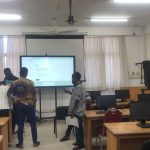The Noguchi Memorial Institute for Medical Research (NMIMR) hosted the kick-off meeting of the Pan-Africa Network for Genomic Surveillance of Poverty Related Diseases and emerging pathogens (PANGens) to disuss the intricacies of poverty related diseases such as malaria, tuberculosis and etc.
The meeting was held on the 16th of January, 2024 at the Noguchi Conference Hall in the University of Ghana.
The meeting involved the discussion of the intersection of Genomics and Surveillance, which provides understanding to the intricacies of poverty related diseases and formulate targeted interventions.
In her welcome address at the meeting, Director of the institute, Prof. Dorothy Yeboah-Manu, highlighted the importance of the meeting, explaining how discussions on the genetics involving poverty related diseases could lead to solutions in the management of such diseases.
“We all know during the COVID everybody got to understand the importance of understanding genomic variance…. Understanding the genetic sequence of any germ or pathogen that is causing the disease will give us understanding on how to develop vaccines, diagnostics and understand how the disease spreads. In order to fight the diseases, a lot of studies need to be done to provide understanding on how the germs or bacteria are changing.”
Also present at the event, Chairperson of the meeting and Pro Vice-Chancellor Office of Research, Innovation and Development (ORID) at the University of Ghana, Prof. Felix Ankomah Asante, spoke of the project’s objective to partner with the World Health Organization (WHO) and Africa Center for Disease Control and Prevention (CDC), to achieve its goals.
“I believe the objective of the consortium is well abiding with both the World Health Organisation WHO and the African CDC. Leaders in these organizations have committed enormous resources into building capacity in Africa to prepare the work force needed to make genomic surveillance a retaining practice. This will lead to improvement in our disease control program through the development of better and more reliable interventions and help us detect potential and deadly threats.”
In presenting an overview of the project, PANGens consortium Project Coordinator and Professor at the University of Namibia, Prof. Stefan Nieman drew light on tuberculosis as one of these diseases, with emphasis on the disease’s detection and its treatment.
“The aim of the project is that every tuberculosis case should first be detected, then the drug resistant testing should be obligatory to find the appropriate drugs for the tuberculosis patient to stop the transmission of multi drug resistant tuberculosis. For us it is instrumental that each and any TB case is first detected and when it is detected, then drug resistant testing should be obligatory.”
Prof. Nieman further mentioned collaborations with countries like Namibia, particularly to local stake holders such as the National Tuberculosis Program to inform them about the findings of their studies as they attempt to implement potential interventions.
The PANGens consortium is a gathering that brings together great minds and unity in the pursuit of advancing in genomics research. Scientists in Africa from countries such as South Africa, Tanzania, Namibia, Ghana among others in partner with European countries such as Germany, Netherlands, Switzerland are working together to establish a genomics surveillance platform in Africa to monitor infectious diseases.
The consortia provides a platform to build capacity, network and share scientific knowledge and provide a very good means of disseminating important evidence based scientific findings conducted and accepted by scientists within the continent geared towards improved health particularly in Africa and around the world.
–
Story by: Joycelyn Makafui Agbo | univers.ug.edu.gh




